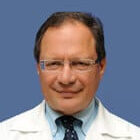Rectal Cancer Treatment in Israel

34% of patients who come to Israel from the Eastern European countries for rectal cancer treatment, receive totally different diagnoses from Israeli doctors.
The examination program for rectal cancer in Top Ichilov is scheduled for 3-4 days. It costs $2,935.
Minimally invasive surgery: transanal excision (TAE), transanal endoscopic microsurgery (TEM).
Organ-preserving surgery: low anterior resection (LAR), proctectomy with coloanal anastomosis.
Radiation therapy: intensity-modulated radiation therapy (IMRT), intraoperative radiation therapy (IORT), 3D conformal radiotherapy (3D-CRT), stereotactic radiotherapy, brachytherapy (intracavitary and interstitial).
Targeted therapy: trastuzumab, lapatinib, pertuzumab for HER2-positive rectal cancer. Monoclonal antibodies cetuximab and panitumimab for the BRAF genetic mutation, larotrectinib and entrectinib for NTRK mutation. Protocol encorafenib+binimetinib+cetuximab, introduced in 2022.
In Top Ichilov, rectal cancer treatment is provided by a multidisciplinary team. It includes:
- Surgical oncologist, Professor J. Klausner;
- Oncologist, Doctor I.Stefanski;
- Radiation therapist, Doctor E. Kaner.
WHAT TO EXPECT FROM THE EXAMINATION FOR RECTAL CANCER IN TOP ICHILOV
Day 1: Initial Examination
Examination and consultation, health history in Hebrew, preparation of medical documents, referrals for laboratory and instrumental examinations, Dr. I. Molchanov. Tissue samples (slides and/or paraffin blocks) are immediately sent to the laboratory for revision.*

*For revision, the patient has to bring a medical document identifying slides/blocks.
*In case of unsatisfactory slide quality, it will be necessary to produce new preparations out of existing blocks (with additional charge).
*In the absence of slides/biopsy blocks, you will be offered biopsy** in our medical center (with additional charge).
**A biopsy is the removal of tissue for subsequent macro- and microscopic examination. There are different methods of collecting tissue samples. The technique depends on the tumor location. For rectal cancer, biopsy is usually done during colonoscopy.
Day 2: Diagnosis
The patient undergoes recommended procedures with a coordinator who accompanies them and provides medical translation.
- Comprehensive clinical and biochemical blood testing (CBC) to detect anemia (low levels of red blood cells) that may be caused by internal bleeding and to assess creatinine levels that show how the kidneys work. If the level of creatinine is elevated, the solution for radioisotope scanning cannot be administered to the patient.
- Analysis of urine.
- Carcinoembryonic antigen (CEA) blood test. CEA is a tumor marker specific for rectal cancer. Its levels are also used to control cancer treatment in Israel.
- PET-CT (positron emission tomography in Israel)* / CT
*This study is done with several limitations:
- Not sooner than 2-2.5 weeks after chemotherapy.
- Not sooner than 5-6 weeks after radiation therapy.
- Not sooner than after surgical treatment (surgery).
Day 3: Treatment Planning
To review the examination results and receive a treatment plan, the patient consults with one of the experts:
- Oncologist (Doctor I.Stefanski);
- Surgical oncologists (Professor J. Klausner, Doctor R. Greenberg, Doctor A. Subhi);
- Radiation therapist (Doctor D. Matseevski).
Final consultation with Dr. Molchanov: review of the examination results, referrals according to the protocol of treatment in Israel, hospital discharge summary in the English language.
Price for rectal cancer diagnosis: $2,935
✓ Right Now: Get your free consultation with a Top Ichilov physician
It is important to correctly determine the type of the disease before starting treatment in the country of residence. Consult an Israeli physician right now, free of charge. Find out the prices for the necessary diagnostic procedures in Top Ichilov.
PHYSICIANS WHO TREAT RECTAL CANCER IN TOP ICHILOV
Rectal cancer treatment and diagnosis in Top Ichilov is provided by the leading Israeli oncologists:

Professor Joseph Klausner, internationally renowned abdominal surgeon, has been operating on the digestive tract for over 40 years. Heads the Department of Surgery in the Ichilov Medical Center. Winner of prestigious Israeli and international awards, author of over 250 scientific publications.

Doctor Irina Stefanski, oncologist, Head of Chemotherapy Department, Deputy Head of Oncology Department. Professional experience in oncology: about 27 years. One of Israel’s best specialists in complex rectal cancer therapy.

Doctor Ron Greenberg, leading specialist in stomach and colon surgery. Operates in the Top Ichilov Hospital. Work experience: about 40 years. Has complete mastery over laparoscopic and organ-preserving surgery for rectal cancer.

Professor Einat Even-Sapir, the best Israeli expert in nuclear medicine. Interprets PET-CT scans that are used for rectal cancer staging and metastasis detection all over Israel.

Doctor Diana Matseevski, leading oncologist of the Ichilov Hospital. Specializes in treating cancer with radiation and chemotherapy.

Doctor Einat Shacham-Shmueli, oncologist, Head of Gastrointestinal Oncology Subdivision. Clinical experience: about 30 years. Leads international research in gastrointestinal oncology. Uses modern radiotherapy methods in treating cancer.
WHAT RECTAL CANCER TREATMENTS ARE USED IN ISRAEL?
Surgery
Surgical intervention is the most common method of rectal cancer treatment in Israel. Surgical treatment of rectal cancer is recommended if the tumor hasn’t spread to distant organs and tissues. The type of surgery recommended to an individual patient depends on the stage and location of the tumor.
- Polypectomy. Polyps in the rectal lining are usually removed during colonoscopy.
- Local excision. If the tumor is small and hasn’t grown through the wall of the rectum, it can be removed through the anus, without external incisions.
- Proctectomy (rectal resection). The doctor removes the affected part of the rectum with a margin of healthy tissue that surrounds it. Nearby lymph nodes are also removed for microscopic examination.

Depending on the tumor location, experts recommend either sphincter-preserving surgery or sphincter excision. The line that means certain preservation of the anus is drawn at the 7cm height from it. The 5cm height is considered borderline, and surgical methods in this case are selected individually, considering the patient’s age, overall condition, and the spread of the cancer.
Colostomy (artificial connection between the colon and the abdominal wall) may be temporary or permanent. The permanent colostomy is done after rectal resection; the temporary colostomy, as a stage of surgical treatment, is followed by colon reconstruction.
Surgical intervention may be accomplished in several ways:
- Traditional open surgery.
- Minimally invasive surgery: during a laparoscopic procedure, the doctor makes small incisions in the abdomen to insert the camera and surgical tools.
Pelvic exenteration. If the rectal cancer has spread to other organs, including colon, bladder, prostate gland or female reproductive organs, these organs may be removed or partially resected during surgery. Such extensive interventions often require colostomy, but when possible, the Top Ichilov doctors perform sphincter-preserving surgery to avoid colostomy.
The rectal cancer treatment protocol almost always combines surgical methods and radiation therapy, chemotherapy and/or other treatments. Chemotherapy and radiation therapy may be prescribed:
- Before surgery to increase its effectiveness. This is called neoadjuvant therapy.
- After surgery to prevent recurrence. This is called adjuvant therapy.
Chemotherapy
The Top Ichilov Clinic in Israel offers the most advanced and effective options for rectal cancer chemotherapy. Chemotherapy is used:
- For stage 2 or stage 3 rectal cancer in combination with radiotherapy, before and after surgery.
- For stage 4 rectal cancer – as the main treatment or (in some cases) in combination with surgery or radiation therapy.
- For recurring cancer.
In each particular case, the treating physician selects the method of chemotherapy administration personally for every rectal cancer patient.

Depending on the drugs prescribed for the patient, they may be administered:
- The drug is given through a small needle inserted into the vein. The drug may be given slowly, via IV line, during several hours, or fast – within several minutes. It may also be administered directly into the artery feeding the tumor.
- The patient takes the medicine in the form of pills.
To reduce damage to healthy cells and give them a chance to recuperate, chemotherapy is used in cycles. In each particular case, the treating physician decides upon the frequency of drug administration and the length of rest periods.
Targeted Therapy
Top Ichilov offers new treatment methods for some types of rectal cancer. These advanced drugs stop the growth of cancer cells by interacting with certain proteins and receptors of the blood vessels that feed the tumor.
Radiation Therapy
Top Ichilov provides the state-of-the-art radiotherapy techniques for rectal cancer treatment, including:
- 3D conformal radiation therapy: connects several beams out of different sources, reduces the radiation exposure for surrounding tissues, and creates maximum effect in the target point.
- Intensity modulated radiation therapy (IMRT): a radiotherapy method that involves simulation (creation of a 3D tumor model) and irradiation with regard to the form of the tumor.

Intracavitary radiation therapy is a modern, sparing treatment method used for small rectal tumors. Irradiation is performed with a special device inserted into the anus. Within a few minutes, the tumor receives a high dose of radiation. Treatments are carried out 4 times with 2-week intervals. This method has an advantage: radiation delivered to the rectum does not penetrate skin and other tissues of the abdomen. This allows to protect healthy tissues and minimize the side effects of treatment. The method helps older people avoid surgery and colostomy.
TREATMENT METHODS IMPLEMENTED IN 2024
- Trastuzumab deruxtecan. This antitumor 3-component drug based on a monoclonal antibody proved its effectiveness in the treatment of metastatic HER2-positive colorectal cancer.
- Braftovi (encorafenib). In 2021, the drug was approved in the European Union and the USA for use in patients with BRAF mutation-positive colorectal cancer. The BRAF gene mutation is found in about 10% of colorectal cancer patients.
Braftovi became the first BRAF inhibitor indicated for rectal cancer. Clinical trials showed that this drug increased survival by 40% in comparison with standard therapy.
How To Receive Rectal Cancer Treatment In Top Ichilov
- Call the clinic right now: +972-37621629
- Or fill in the form below. Our doctor will contact you within 2 hours.

Publication Date:



















